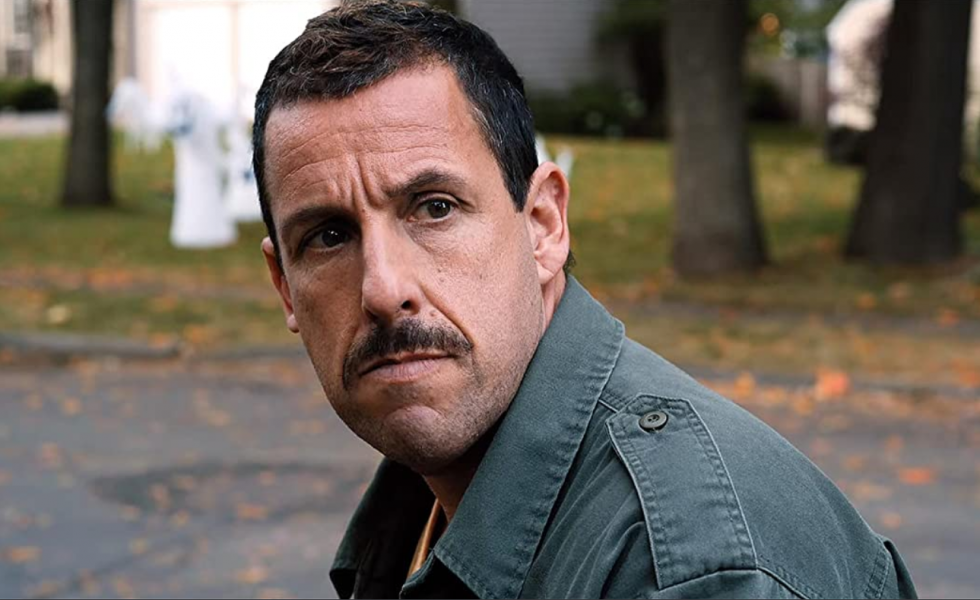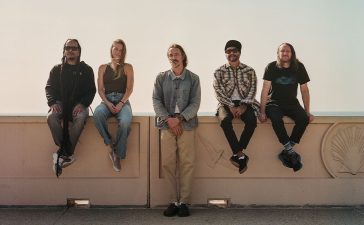I’m starting to think we’ve done the Sandman wrong.
Adam Sandler is an interesting guy who’s had an interesting career. A genuinely gifted comic, he graduated from the skit comedy gladiator academy that is Saturday Night Live fairly quickly, and after a handful of movie appearances, really hit his stride with the one-two punch of Billy Madison (1995) and Happy Gilmore (1996), amiably anarchic big screen comedies that cemented his “idiot manchild” onscreen persona and, while critically rather reviled, were popular with audiences and opened the way for bigger things.
“Bigger things” in this case meant making a successful play for romcom leading man status with the smash hit The Wedding Singer (1998), and taking a well-regarded dramatic turn in Paul Thomas Anderson’s Punch-Drunk-Love (2002), a film that treated Sandler’s by-then established onscreen persona – amiable idiot with anger issues – seriously, and to excellent effect.
Weirdly, it was in between these two flicks that the general consensus around Sandler began to shift, even if the returns on his films were generally good. Between The Wedding Singer and Punch-Drunk-Love we got The Waterboy (1998), Big Daddy (1999), and Little Nicky (2000), all films that feel partly in line with the Madison/Gilmore loose duology, but also lesser than it. To be fair, time has been kind to The Waterboy, nobody seems to give half a fart about Big Daddy, and Little Nicky is, one near-perfect Ozzy Osborne cameo aside, an absolute train wreck of a film, and one that puts all of Sandler’s shortcomings as a performer, writer, and producer on display. It turns out that what Sandler does well is a fine balancing act, and even he can’t get a 100% hit rate. Little Nicky is lazy, obvious, grating, cheap, mean-spirited, and – damningly – about as funny as finding a lump in your testicle. And it’s not even his worst film – take a look at Jack and Jill (2011) and That’s My Boy (2012) for some real Sandman barrel-scraping.
But then also look at Uncut Gems (2019) and try and get your head around the fact that the same guy can be in that nerve-shredding indie drama and the low stakes laziness of Grown Ups (2010). It’s a mystery for the ages.
The received wisdom has always been that Sandler “retreats” into his low effort ensemble comedies after taking a critical drubbing, doing something he finds easy compared to what could be interpreted as more challenging, but I don’t think that’s true. For one thing, Sandler has never seemed to care for critical acclaim or awards season glory at all, although he did deliver the greatest acceptance speech of all time when he picked up Best Actor for Uncut Gems at the Independent Spirit Awards:
But also, Sandler dabbles in drama on the reg; check out Funny People (2009), Reign Over Me (2007), and The Meyerowitz Stories (2017) for proof. He was at one point going to feature in Tarantino’s Inglourious Basterds, and I wish we lived in the universe where that happened. He’s never seemed uncomfortable in a drama, either; while he may play an array of awkward characters, his performances have always been supremely confident, whether he’s doing his usual schtick or immersing himself in more adult fare. And yet he charts this weird career course, tick-tocking from drama to comedy, romantic lead to small town grotesque, acclaim to (what should be, for any other performer) embarrassment.
Which brings us to Nicolas Cage, the other prominent and talented actor whose career path has been erratic. Cage is such a controversial actor that the argument over whether he’s a good performer or a bad one spawned an entire episode of Community…
…when the truth is that weird transcends “good” or “bad” and Cage is a wildly entertaining screen presence who had to take a lot of very odd jobs over the past several years to deal with a massive tax debt. Cage’s wilderness years are now part of his mythology, and he’s carved himself a place in firmament as a kind of icon of gonzo cinema with turns in Mandy (2018) and Color Out of Space (2019).
Sandler, to this point, hasn’t been afforded the same affection as Cage, but maybe he should be. Watching Uncut Gems and the quite enjoyable Hubie Halloween (2020), his latest Netflix effort, back to back is dizzying; one minute the Sandman is dragging a cheese grater across our nerves as an adrenaline-addicted diamond merchant, the next he’s letting a hall full of schoolkids pelt him with food as the titular Halloween-obsessed simpleton. That’s range, brother.
I think the difference is that while Cage had his weird choices forced upon him (the IRS doesn’t care if you’re filming an exploitation flick in Bulgaria or a drawing room drama in Manhattan, they just want the money) Sandler’s choices are his own, and there are things he cares about way more than making a quote-unquote good movie. Like taking care of his friends; it’s accepted that one of the main goals of Sandler’s Happy Madison production shingle is keeping his buddies like Rob Schneider, David Spade, and Kevin James gainfully employed, which is why a) he basically has his own repertory company of supporting players, and b) the script quality often seems to take a back seat to any other considerations, because at the end of the day it’s not that important in the grand scheme of things. I don’t think Sandler wants to make bad movies, per se, but I think he trusts his process implicitly, which tends to involve getting all his friends together in some fun location and shooting a lot of improv in between barbecues and basketball games. At the very least, it means that Steve Buscemi gets a paid vacation every couple of years.
The Adam Sandler approach to filmmaking seems very much predicated on a “fuck it, why not?” kind of attitude, but tempered with a keen financial acumen. I think he picks films that interest him and that he thinks could work, but I also think he’s careful to make sure that everything is not just for his benefit, but for his whole crew. What that means is that while the artistic result is something of a shot in the dark (see The Ridiculous 6 and The Do-Over for big swings that completely miss), financially everyone is always going to do well. Sandler definitely sees himself as the central cog of a business enterprise, and his shareholders are his co-stars and collaborators. When he does something like Uncut Gems, he’s only hanging himself out there; when it’s time for Hubie Halloween, that’s one for the whole team, and he adjusts his sights accordingly, but brings the same commitment to both roles.
And that’s the Riddle of the Sandman: a hugely talented and canny performer making films by his own lights and according to his own whims, unbothered by critical acclaim or derision. If he directed we’d call him an auteur, but for now let’s agree that we shouldn’t call him a punchline anymore.










